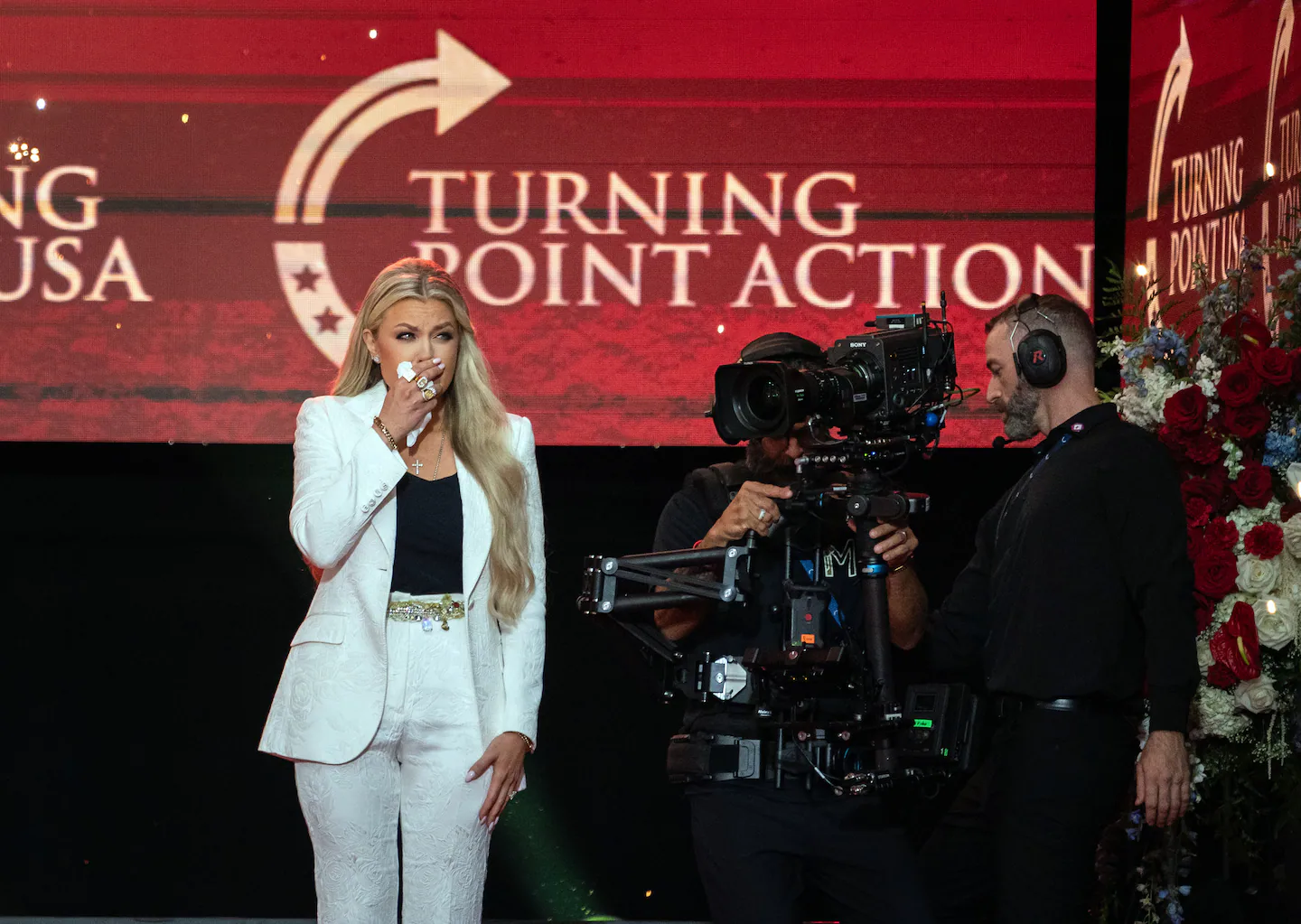
More than any other time of year, this is the season when questions of guilt, repentance, and pardon are most on the Jewish mind.
Fittingly, those very questions were thrust into the national conversation when Erika Kirk, the widow of conservative activist Charlie Kirk, addressed tens of thousands of mourners at the memorial service for her slain husband in Arizona: “That young man … I forgive him.” Her words reverberated far beyond her immediate audience, and were swiftly praised and echoed by pastors, commentators, and reporters alike.
Bishop Robert Barron, an influential Catholic leader with millions of followers, hailed Kirk’s act as “one of the most impressive and moving displays of the gospel I have ever experienced.” The evangelist Rev. Franklin Graham marveled that the “world just witnessed something incredible.” The Washington Post offered applause in an editorial headlined “The Erika Kirk example.” The acclaim spanned the political divide. From panelists on MSNBC to the reinstated late-night TV host Jimmy Kimmel, there was near-universal agreement that — to quote my Globe colleague Joan Vennochi — “expressing forgiveness toward her husband’s alleged killer was an amazing moment of grace from Erika Kirk.”
That reaction was one we have seen after other horrendous crimes were followed by similar acts of public forgiveness.
When relatives of the parishioners murdered by Dylann Roof in a South Carolina church in 2015 said they forgave the killer for his atrocity, their words attracted near-universal praise. So did those of the bereaved Amish parents and grandparents in Lancaster County, Pa., who reacted to the grisly 2006 massacre of their daughters by vowing to “not think evil” of the man who slaughtered the girls, and insisting that none of them “wants to do anything but forgive.” More recently, Brandt Jean not only announced in court that he forgave Amber Guyger, the former Dallas police officer convicted of murdering his brother, but then asked the judge for permission to publicly hug the guilty woman.
Yet for all the admiration such acts inspire in others, I find them deeply disturbing — especially this week, when my religious tradition focuses intensively on what we must do to win God’s mercy and to atone for our transgressions. Such proclamations of automatic forgiveness may be moving and dramatic — but to my mind they are also unhealthy, troubling, even dangerous.
To be clear: I don’t for a moment disparage Erika Kirk or any survivor who invokes the language of forgiveness in the rawness of grief. My unease is not with her faith or her sincerity. It is with the reflexive applause of the crowd, and with the instant elevation of her words as the highest model of religious fidelity. It is with those who believe their faith requires them to forgive every crime and pray for every culprit — no matter what the offender did or whether he even wants to be forgiven.
Judaism prizes forgiveness as much as Christianity does. Indeed, the first recorded occurrence of one human being forgiving another can be found in the Hebrew Bible, near the end of Genesis, when Jacob’s son Joseph forgives his brothers for having sold him into slavery. The same verse in Leviticus (19:18) that contains what may be the most famous positive commandment, in the Torah — “Love your neighbor as yourself” — begins with a related negative injunction: “You shall not take vengeance, nor hold any grudge.”
As a child growing up in a Jewish home, I was taught to recite a prayer at bedtime that begins with forgiving anyone who may have wronged me that day. When I became a father, I taught my sons to recite the same prayer. It opens with these words: “Master of the universe, I hereby forgive anyone who angered or antagonized me or sinned against me — whether physically or financially or through disrespect, or in any other matter affecting me; whether involuntarily or willfully, carelessly or deliberately; whether by word or by deed. I forgive every person: Let no one incur punishment because of me.”
Recited nightly by observant Jews, the prayer is a reminder that forgiveness is central to Jewish ethics — that we must not cling to bitterness, and that we should be ready to pardon those who wrong us. But that same prayer makes just as clear what forgiveness is not: It is not blanket absolution, it is not a free pass, and above all it cannot be conferred for injuries suffered by someone else.
Perhaps it was in that spirit that Erika Kirk announced “I forgive him.” Perhaps she meant to absolve the killer not for destroying her husband’s life or for depriving their children of a father, but solely for the pain he inflicted on her personally.
But that wasn’t what she said. And what most people heard seems to have been far more sweeping. To judge from the flood of commentary, they understood her to be forgiving her husband’s killer for the killing itself. That interpretation was celebrated as the epitome of Christian virtue, but it is a perilous misunderstanding.
I remember writing many years ago about the Reverend John Miller, who preached at a Martha’s Vineyard church one Sunday when President Clinton was in attendance. “I invite you to look at a picture of Timothy McVeigh and to forgive him,” Miller said, speaking of the domestic terrorist who had been found guilty a few months earlier of perpetrating the ghastly Oklahoma City bombing in 1995. “If we profess to be Christians, then we are called to love and forgive.”
But no one has the right to forgive someone else’s cruel and deliberate killing.
Forgiveness must be earned. No major religious tradition has ever taught that absolution is automatic — that a willful murderer or terrorist could be forgiven without repentance. Dietrich Bonhoeffer, the Lutheran pastor executed by the Nazis, warned against what he called “cheap grace”: forgiveness without repentance, mercy without justice.
Such forgiving on behalf of others corrodes the moral order. It implies that even the gravest atrocities can in some fashion be waved away by a bystander’s declaration. If forgiveness does not follow repentance, it is hollow and sterile.
A few months after that Martha’s Vineyard sermon, a high school student in West Paducah, Ky., opened fire on a group of classmates, killing three and wounding six. Within hours, The New York Times reported, “there was a handwritten sign in front of the school that said, ‘We forgive you, Mike.’” As I wrote at the time, is that really the way to make the world a better place? By assuring anyone who would do terrible things to others that he will be automatically forgiven afterward by decent and loving people?
Even repentance may not be enough. In a famous passage, the Talmud teaches that for transgressions between a person and God, sincere confession on the Day of Atonement is effective. But when it comes to harms done to others, God does not forgive until the offender apologizes to those he injured. Many Jews do exactly that, approaching friends, acquaintances, colleagues, and family members to ask their pardon for having done things that caused pain or gave offense during the year gone by.
That was the tradition in which Jesus was raised and that was the moral lesson he taught his disciples.
“If your brother sins against you, rebuke him; and if he repents, forgive him,” Jesus said in the Gospel according to Luke (17:3-4). “And if he sins against you seven times in the day, and turns to you seven times, saying, ‘I repent,’ you must forgive him.”
In short, repentance must come first. Only then is forgiveness possible. And in any case, you have the right to pardon only the wrongs “your brother” committed against you — never those he committed against someone else. Jesus on the cross prayed that God forgive those who were tormenting him. He never beseeched God to forgive the hideous deaths suffered by the thousands of other Jews being crucified in Jerusalem that day.
Erika Kirk’s faith is real, and her grief is beyond words. If her declaration of forgiveness helped her shoulder that grief, no one can begrudge the solace it gave. But to seize upon such words as a public model and cheer them as the highest expression of religious virtue is to confuse sentiment for morality. Yom Kippur drives home the lesson that forgiveness is too sacred to be automatic, and too serious to be presumed on behalf of others.
As the Jewish year 5786 gets underway, I pray that all of us, believers and skeptics alike, may be inscribed in the Book of Life, and blessed in the months ahead with health, with happiness, with success, and with peace.
Above all, with peace.



